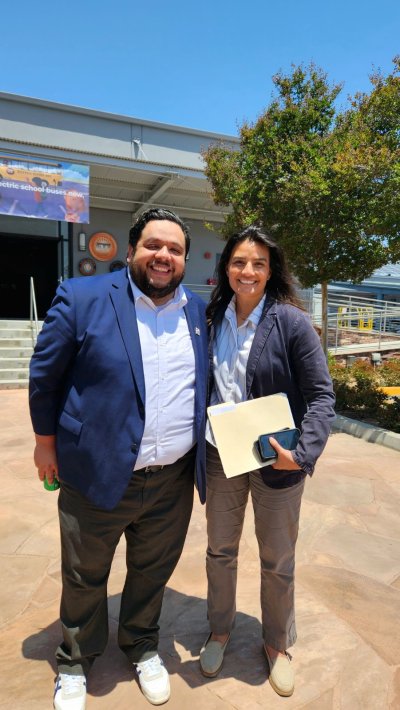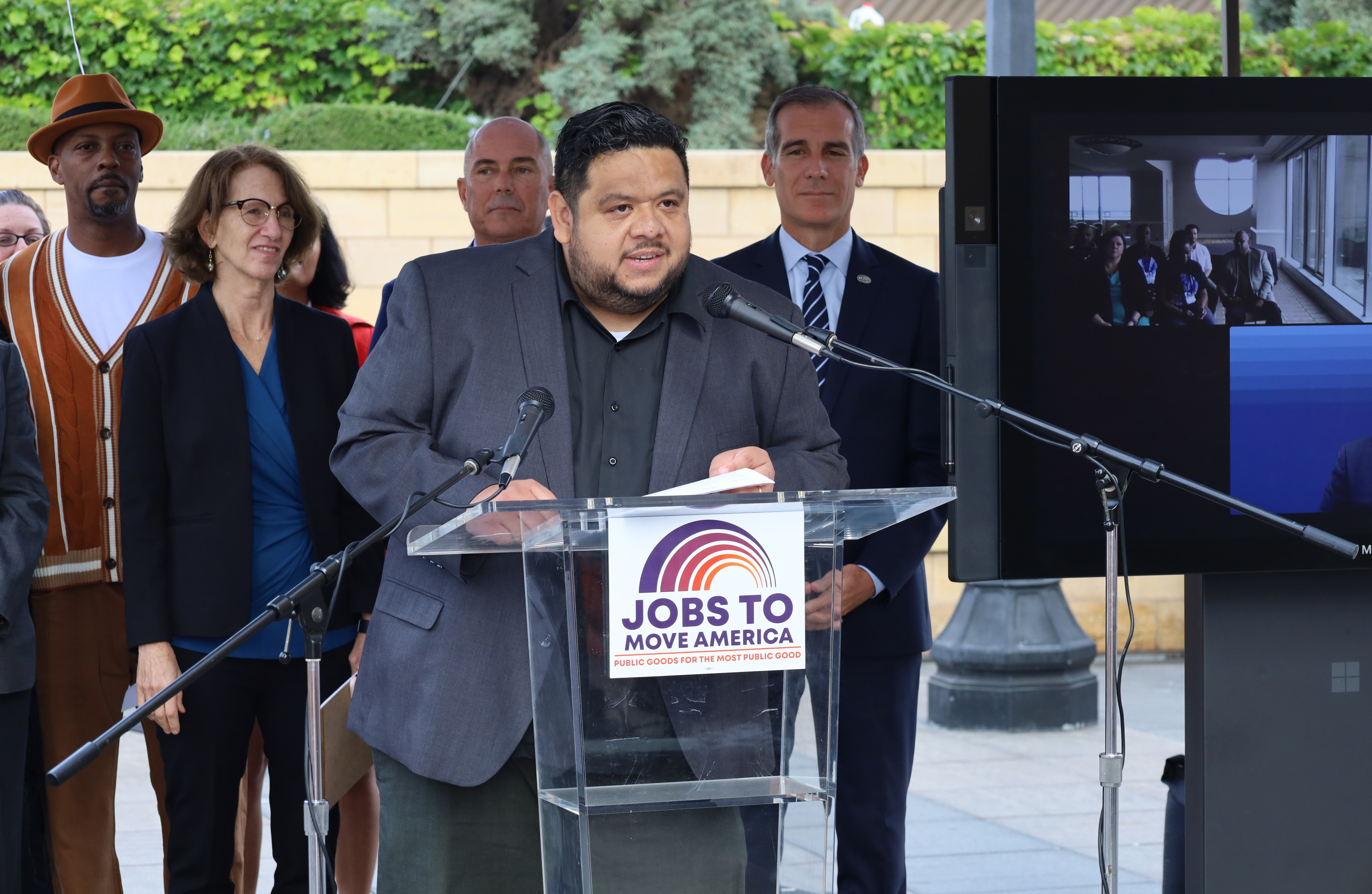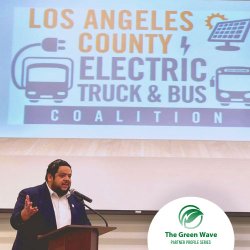Welcome to The Green Wave! This is an ongoing series of profiles featuring the outstanding organizations we partner with at GRID Alternatives Greater Los Angeles, and their environmental justice & sustainability projects focused on the advancement of a cleaner environment for future generations.
We're proud to feature Jobs to Move America - a national nonprofit organization that partners with many labor, environmental, community, civil rights, faith, and workforce groups across the country. The idea behind Jobs to Move America is that public investment in urban infrastructure should result in high-quality training and employment opportunities for people that have been historically excluded from earning a family-sustaining wage and these folk should benefit from these jobs. We had the pleasure of catching up with Jobs to Move America’s California Director, Héctor Martin Huezo to find out a little more about their work.
GRID GLA: How do Jobs to Move America's goals and mission contribute to making a sustainable and clean environment?
Héctor Martin Huezo: We believe that our economy and environment aren't going to be sustainable if jobs that pay family-sustaining wages are destroyed or displaced. If the new jobs in clean technology and the transition away from fossil fuels don’t pay family-sustaining wages, then they're just going to be bad for families, bad for communities, and not the types of economy that we envision at this critical time when we have to transition off of fossil fuels.
All of this investment in new technologies is being paid for and funded by federal money to combat climate change. And if this is our collective money or collective resources, then at the very least, we should ensure that the majority of it actually gets to communities that have been historically the most impacted by pollution and have not had opportunities to stabilize or to thrive as a result of disinvestment. So we believe that our contribution to this work is ensuring that the transition to newer and cleaner technology doesn't leave behind working people and working families.

GRID GLA: What project are you the most proud of and how did it help your community?
Héctor Martin Huezo: Yeah, this is a cool question. So our work is really focused on two specific areas. One is with public agencies and getting them to think more critically about how they're holding companies accountable for creating good jobs.
And then the other piece of our work is working with some of those companies directly on what we call community benefits agreements and this is something that I'm really proud of. Community benefits agreements are private, legally enforceable agreements between a company and us, or a coalition that spell out very specific behaviors and goals that the parties commit to ensuring that disadvantaged workers - workers with disadvantaged work history - or workers that are underrepresented in the clean tech manufacturing sector, are prioritized for the jobs that result from all of this public investment.
And so I've been part of three community benefits agreements that Jobs to Move America has negotiated. The first was with an electric bus manufacturer in Los Angeles called B Y D. The second was with another bus manufacturer, an electric bus manufacturer, also in LA. And then the third, or our most recent one was really exciting because it was our first multi-state agreement, and it was with North America's largest bus maker, and they committed to implementing some of these practices at twelve of their US manufacturing facilities. So we're talking about new ways of partnering with community and labor for thousands of jobs across the country. What's been most exciting about it has been that in this process, we've been able to really show community organizations and workers new ways for them to engage with their own employer, where they have more decision-making, they have more of a say in how the company actually hires, trains, and recruits people. And they're part of sort of shaping how a company accommodates folks that would otherwise have been excluded from jobs because they don't recruit from specific areas, or they're not willing to overlook certain barriers or biases that often exclude workers of color or women, single heads of household or formerly incarcerated folks. So that's been really exciting. We feel like it's a way for workers and community groups to practice democracy at their job. And it's a way for all of the things that companies say that they want to commit to in terms of hiring and recruiting to make those things real, because they're actually led and informed by the people who are directly impacted and should be getting those jobs.
Community benefits agreements are private, legally enforceable agreements between a company and us, or a coalition that spell out very specific behaviors and goals that the parties commit to ensuring that disadvantaged workers - workers with disadvantaged work history - or workers that are underrepresented in the clean tech manufacturing sector, are prioritized for the jobs that result from all of this public investment.
-Héctor Martin Huezo, California Director, Jobs to Move America
Q: What types of projects will you be working on in the upcoming years?
Héctor Martin Huezo: This is a really exciting question to think about because we've had a lot of success in transit vehicle manufacturing, but with all of the investments that are coming out of the Biden-Harris administration, we're looking to run similar kinds of initiatives for offshore wind manufacturing, battery manufacturing, and mineral development, and even new areas like grid hardening and semiconductor manufacturing. These are all in the manufacturing space, but they're new areas of work where we feel like the tools and the learnings that we've had experience with in the transportation sector are very similar and can apply to these other types of manufacturing as well. So I think those are areas that we're actively growing into over the next couple of years.
Q: As a partner of GRID Alternatives, what do you look forward to when working with us?
Héctor Martin Huezo: Before I talk about how great GRID is, let me just talk about what I think may be uninspiring, So the traditional workforce model for how we prepare workers for jobs is really uninspiring. It isn't focused on the communities who need it the most and is very focused on fixing workers for the jobs, as opposed to there being any kind of accountability for jobs being on the hook to provide decent wages, respect workers' rights, and be deliberate about environmental impacts.

And so what's exciting about working with GRID is that, one, we're not a workforce organization. We need expert job training and placement organizations to be part of our coalitions. For us to be able to successfully do our work, we can help soften the ground and build the pressure that's necessary to get commitments, but when it comes time to actually train and equip people for the jobs and get them the skills GRID has an amazing model focused on targeted communities. And that's exactly the vision that we feel is the best approach for giving specific populations the opportunities to work in this industry, grow their careers, build their families and communities.
So that's, I think, the most exciting thing. We like aligning ourselves with non-traditional workforce programmes because we think the traditional model really fails a lot of workers. And so we see GRID as a natural partner in that. And y'all have also already demonstrated a major commitment to at risk youth and disadvantaged communities. It is part of what we're committed to as well. So we think it's always an exciting partnership when our values align in that way.
Q: As part of the e-TRUC committee, how do you think that eTRUC will make a positive impact in your community?
Héctor Martin Huezo: Well, I mean, it's incredibly exciting. There's a really diverse group of stakeholders that are part of this committee and are informing the work. And these standards around how people get trained for jobs in this emerging sector is probably going to become the model for other regions or states. So it's a really exciting opportunity. It's important that we get the jobs and the equity components from the start, and this is an opportunity to lead with that. So I'm really excited to be a part of the committee.
--
Thank you Hector for giving us the opportunity to highlight the fantastic work Jobs to Move America has been doing over the past decade. GRID is currently talking to other organizations about how we can create a bigger curriculum, not just for solar, but energy efficiency, clean mobility, transportation, battery storage etc, and we’re looking forward to strengthening and deepening our partnership with you in those areas.
GRID Alternatives is a 501c3 non-profit that offers
- Free solar panels to income qualified families
- Free solar installation job training to anyone over 18
- Commercial solar installation for nonprofit buildings, resilience centers, government buildings, and affordable housing buildings
Contact us to learn more
Keep up with GRID GLA on a daily basis. Follow us on:
Instagram
Facebook
Twitter
Or donate today to support our mission

